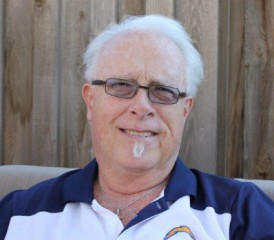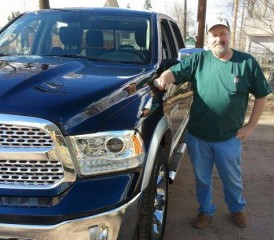Survivor Andy A. Beating the Odds Again

Fact Checked | Written by: Tim Povtak | Last Update: 03/12/2025 | 5 Min Read
Andy A. beat the odds in 2004 by surviving a horrific, 70 mph motorcycle crash that propelled him into a concrete retaining wall, breaking his pelvis and collarbone, three ribs, both feet, puncturing one lung and bruising most other parts of his body.
They originally thought he was dead, coming to rest like a lifeless rag doll on the southbound side of Interstate 215 near San Diego, 90 feet from where a car struck him in a northbound lane during his morning commute to work.
He lived to beat the odds — again.
Andy, 66, also is a three-year, pleural mesothelioma survivor, still thriving with some miraculous results from an ongoing clinical trial involving Amatuximab (MORab-009), an experimental immunotherapy drug.
“I guess I’m an anomaly. I’m doing great right now. I really am. I don’t look like a Stage IV cancer patient,” he said from his home in Southern California. “I consider myself extremely lucky for a lot of reasons. I haven’t won the lottery yet, but I’m working on that.”
Andy, whose last name is being withheld over privacy concerns, was diagnosed in February 2010. He soon found mesothelioma specialist David Jablons, M.D., who is head of the thoracic oncology program at the University of California-San Francisco. Jablons helped enroll him in a multicenter, Phase II clinical trial at UC-San Diego, not far from his home.
It saved his life — for the second time.
Immunotherapy Is Working
Andy has been on a three-week, trial cycle for more than three years. It started in combination with a standard chemotherapy cocktail, but evolved into just the immunotherapy drug, which stopped the tumor growth.
He may have been ineligible for major surgery to remove the tumors because his mesothelioma already had metastasized, but he has become a walking advertisement now for MORab-099 and immunotherapy. He is the only mesothelioma patient still being monitored in San Diego as part of the trial.
Amatuximab is an antibody that targets mesothelin, a protein over-expressed in several cancers. Amatuximab has an ability to bind to mesothelin and trigger a natural immune response, allowing it to stop cancer growth. The on-going Phase II trial at 28 sites began in 2008.
It has not worked as well for everyone as it has for Andy, but it has shown enough promise to earn an Orphan Drug designation from the FDA, which should accelerate its accessibility for all mesothelioma patients. The Orphan Drug designation provides financial incentives to pharmaceutical companies to work on therapies for rare diseases.
“I don’t know exactly why I’m doing so well. I must have a great immune system that works well with this therapy. I know the mesothelioma is there, but I just try and ignore that fact,” he said. “There are days when I think about it, but I try to stay busy, try to stay positive all the time. And for now, it’s working.”
Andy keeps busy in various way, including working out at a local fitness center, as well as the weight room set up in his garage. He and his wife are planning their first trip to Australia in 2014, they recently traveled to Maine for a vacation, and will soon attend a wedding in Florida. The couple also enjoys seeing the grandkids play soccer.
Still Living His Life
“I’m not sitting around waiting to see when this is going to really hit me. You can’t afford to do that. You could walk out the front door and drop dead from a heart attack tomorrow. I’m a firm believer that when it’s your time to go, it’s your time,” he said. “So I’m going to enjoy whatever time left I have.”
He is reminded regularly just how fortunate he has been with mesothelioma, a cancer with no known cure. A friend recently died of mesothelioma, less than 12 months after being diagnosed. Another is struggling with pancreatic cancer. His oldest son’s father-in-law is being treated for prostate cancer. The trip to Maine involved visiting a brother-in-law with cancer.
Andy’s first wife died almost 20 years ago after a short battle with lung cancer that may have been related to asbestos.
“If I didn’t tell you, you wouldn’t really know I’m sick right now,” he said. “I feel good. When our lawyer, a young lady, first came to visit me, she was shocked when I answered the door. She said ‘Are you Andy? You aren’t what I expected for a Stage IV cancer patient.’ I just told her, ‘You aren’t what I expected to see as our attorney.’ We got a good laugh out of it.”
Clinical Trial Was Key
“When I was first diagnosed, it was depressing because everything you would read about it was bad,” he said. “It was one to two years to live. It was tougher on my family than it was on me. We were fortunate to be part of this trial. I think when I go in for my regular treatment, everyone likes seeing me because I’m doing so well.”
Andy retired with his diagnosis in 2010. He had spent 20 years in the home improvement industry, where he was exposed regularly to the asbestos products that likely led to his mesothelioma. He spent another 25 years as a high school math teacher. In fact, he was traveling to school the morning he was hit on his motorcycle.
“I recovered quicker than anyone expected,” he said. “They tell me I stopped traffic really well that day, both sides of the highway. I’m a lucky guy. Always have been. I’m not a big believer in organized religion, but I’ve been part of some prayer groups. And they’ve been wonderful. You can’t help but feel the power of prayer. Maybe that’s what it is.”





